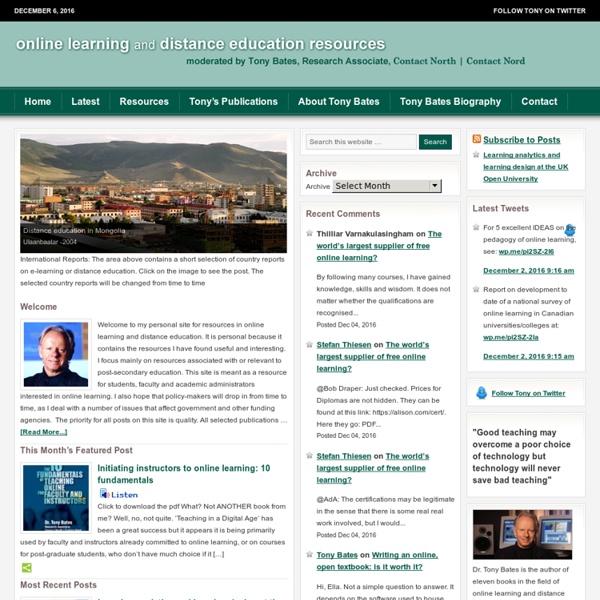



Quandary Home Page Quandary is an application for creating Web-based Action Mazes. An Action Maze is a kind of interactive case-study; the user is presented with a situation, and a number of choices as to a course of action to deal with it. On choosing one of the options, the resulting situation is then presented, again with a set of options. Working through this branching tree is like negotiating a maze, hence the name "Action Maze". Education Database Online Blog Is Apple Still a Game Changer in Education? The words "Apple" and "innovation" often go hand in hand, but the tech giant has been less dominant in education than it has been in other areas. While the iPad has continued to change the way many classrooms function, Apple's once-leading online education platform, iTunes U, is now left out of most discussions about online learning and OpenCourseWare.
MindShift MindShift explores the future of learning in all its dimensions. We examine how learning is being impacted by technology, discoveries about how the brain works, poverty and inequities, social and emotional practices, assessments, digital games, design thinking and music, among many other topics. We look at how learning is evolving in the classroom and beyond.We also revisit old ideas that have come full circle in the era of the over scheduled child, such as unschooling, tinkering, playing in the woods, mindfulness, inquiry-based learning and student motivation. We report on shifts in how educators practice their craft as they apply innovative ideas to help students learn, while meeting the rigorous demands of their standards and curriculum. MindShift has a unique audience of educators, tinkerers, policy makers and life-long learners who engage in meaningful dialogue with one another on our sites.
Learning Management Systems – The Choices Learning Management Systems (also termed Course Management Systems (CMS) learning content management systems (LCMSs) and sometimes Corporate Learning Systems (CLS)) have significantly enhanced learning capabilities within educational institutions (universities, schools, training providers etc.) as well as within individual organizations (government departments, businesses etc.). LMS solutions are becoming more attractive to organizations through enhanced features and reliability as well as reducing costs, in particular as a result of significant improvements in Open Source LMS products. LMS Categories and Considerations Learning Management Systems (LMS) are available in two broad categories; Open Source (and free) and paid-for (propriety).
ID and Other Reflections online learning insights Supporting the use of technology in the classroom Edutech for Teachers Challenge by Choice with Tiered Instruction and Assessment SHIFT eLearning Blog My Adventures in Educational Technology The eLearning Guild Applying Psychology to Understand How People Think, Work, and Relate Helping Educators Thrive in a Connected World